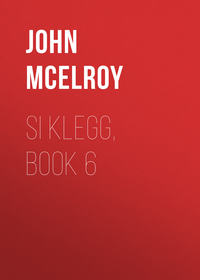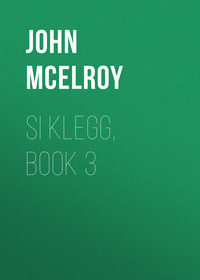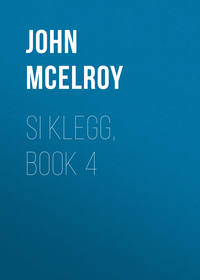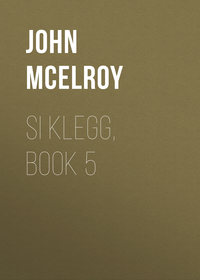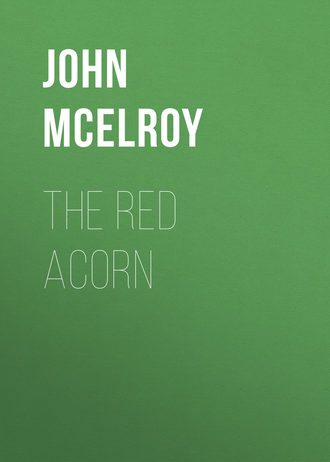 полная версия
полная версияThe Red Acorn
“I know it,” answered Rachel, depressed even more by the apparition of martial law than she had been by the heat.
“And what I have been telling you is only the beginning,” continued the Surgeon, noting the effect of his words, and exulting in their humbling power. “The cornerstone of everything military is obedience—prompt, unfailing obedience, by everybody, soldier or officer, to his superiors. Without it–”
“Major Moxon,” said an officer, entering and saluting, “the General presents his compliments, and desires to know why his repeated orders in regard to the furloughing of men have been so persistently disregarded.”
“Because,” said the Surgeon, getting purplish-red about the cheeks and nose, “because the matter’s one which I consider outside of his province—beyond his control, sir. I am Chief of the Medical Department, as you are perhaps aware, sir.”
“We presumed that you were taking that view of the matter, from your course,” answered the Aide calmly. “I am not here to argue the matter with you, but simply to direct you to consider yourself under arrest. Charges are being prepared against you, to which I will add specifications based on this interview. Good afternoon, sir.” The Aide saluted stiffly and moved away, leaving the Surgeon in a state of collapse at the prospect of what he had brought upon himself by his injudicious contumacy. Mis Rachel was in that state of wonderment that comes to pupils at seeing their teachers rebel agains their own precepts. The Surgeon was too much engrossed in his own affairs to pay farther heed to her. He tapped a bell.
“Orderly,” he said, to the soldier who responded, “conduct this young woman to Dr. Denslow. Inform him that she is to be with us as a nurse, and ask him to be kind enough to assign her suitable quarters. Good afternoon, ma’am.”
In another office, much smaller and far less luxuriously furnished, she found Dr. Denslow, a hazel-eyed, brown-bearded man of thirty, whose shoulder-straps bore the modest bars of Captain. The reader has already made his acquaintance. He received her with the pleasant, manly sympathy for her sex, which had already made him one of the most popular of family physicians in the city where he was practicing at the outbreak of the war.
Rachel’s depressed spirits rose again at his cordial reception.
“I am so busy,” he said, after a brief exchange of commonplaces, “that I’ll not have the time to give you much information this afternoon as to your duties, and I know that you are so fatigued with your journey and the heat that you will not care to do anything but rest and refresh yourself. I will therefore show you immediately to your quarters.”
“This will be your field of labor,” he said, as he led her down the long aisle between rows of cots toward her room. “It’s not a cheerful one to contemplate at first. Human suffering is always a depressing spectacle, and you will see here more of it and more varied agony than you can find anywhere outside of an army hospital’s walls. But as the deed is so is the duty, and the glory of doing it. To one who wants to serve God and his fellow-creatures—which I take it is the highest form of religion—here is an opportunity that he may bless God for giving him. Here he can earn a brighter crown than is given them who die at the stake for opinion’s sake.”
So earnest was his enthusiasm that Rachel felt herself lifted up by it, in spite of her discomforts. But then she turned her eyes away from his impassioned face, and looked over the array of white beds, each with its pale and haggard occupant, his eyes blazing with the delirium of fever, or closed in the langor of exhaustion, with limbs tossing as the febrile fire seethed the blood, or quivering with the last agonies. Groans, prayers, and not a few oaths fell on her ears. The repulsive smell of the disinfectants, the nauseating odor of the sick room where hundreds of invalids were lying, the horrible effluvia of the typhus rose on the hot air, and seemed part of the misery which so strongly assailed her other senses.
She was sick at heart, and with every feeling in active revolt, but without a word she turned and followed Dr. Denslow to a hot, close, little room which had been cut off one end of the hospital, though not so separated from it but that the sounds and odors from the sick wards continually filtered in through the wide cracks in its plank sides. An iron bedstead, of the same pattern as that upon which the sick lay, stood in one corner, and in another was a rudely-fashioned stand, upon which was a tin-basin, a cake of yellow bar-soap, and a bucket of water for washing. This was all the furniture.
As the door closed behind the Doctor, Rachel threw herself upon the cot, in a fit of despair at the wreck of all her fancies, and the repulsiveness of the career upon which she had embarked.
“I can not—I will not—live here a week,” she said to herself, over and over again. “I will die for the lack of comforts—of the decencies of life, even—to say nothing of being poisoned by these horrible smells, or driven distracted by the raving sick and that boor of a Surgeon. But I can not draw back; I would rather die than go back to Sardis with a confession of failure at the very outset of my attempt to play the heroine.”
Then she remembered her last words to Harry Glen: “I only know that you have failed where a number of commonplace men have succeeded, and that is sufficient.”
Would she subject herself to having him throw these words in her teeth? No. Any shape of trial and death, rather.
Chapter XV. Making an Acquaintance with Duty
And with light in her looks she entered the chamber of sickness.Noiselessly moved about the assiduous, careful attendants,Moistening the feverish lip, and teh aching brow, and in silenceClosing the sightless eyes of the dead, and concealing their faces,Where on their pallets they lay like drifts of snow by the roadside.Many a languid head upraised as Evangeline entered,Turned on its pillow of pain to gaze while she passed for her presenceFell on their hearts like a ray of sun on the walls of a prison,And as she looked around she saw how Death the Consoler,Laying his hand on many a heart hade healed it forever.—Evangaline.Nervously bolting the rude door after Dr. Denslow’s departure, Rachel tossed her hat into one corner, and without farther undressing flung herself down upon the coarse blankets of the cot, in utter exhaustion of mind and body. Nature, beneficent ever to Youth and Health, at once drew the kindly curtains of Sleep, and the world and its woes became oblivion.
Early the next morning the shrill REVEILLE called for a resumption of the day’s activities. She was awakened by the fifes screaming a strenuously cheeful jig, but lay for some minutes without opening her eyes. She was so perfectly healthful in every way that the tribulations of the previous day had left no other traces than a slight wariness. But every sense began informing her that yesterday’s experience was not a nightmare of her sleep, but a waking reality. The morning sun was already pouring hot beams upon the thin roof over her head. Through the wide cracks in the partition came the groans and the nauseating odors which had depressed her so on the day before. Mingled with these was the smell of spoiled coffee and ill-cooked food floating in from the kitchen, where a detail of slovenly and untaught cooks were preparing breakfast.
She shuddered and opened her eyes.
The rude garniture of her room, thickly covered with coarse dust, and destitute of everything to make life comfortable, looked even more repugnant than it had the evening before.
The attack of sickness at heart at the position in which she found herself came on with renewed intensity, for the hatefulness of everything connected with the lot she had chosen seemed to have augmented during the passing hours. She tried to gain a little respite by throwing one white arm over her eyes, so as to shut out all sight, that she might imagine for a moment at least that she was back under the old apple tree at Sardis, before all this sorrow had come into her life.
“It is not possible,” she murmured to herself, “that Florence Nightingale, and those who assisted her found their work and its surroundings as unlovely as it is here. I won’t believe it. In Europe things are different, and the hospitals are made fitting places for women to visit and dwell in.”
It would have helped her much if she could have known that the Crimean hospitals, in which Florence Nightingale won world-wide fame, lacked immeasurably of the conveniences and comforts with which American ingenuity and lavish generosity mitigated somewhat the wretchedness of army hospitals.
Lying still became unendurable, she rose, in hopes that action might bring some sort of relief. Such plain toilet was made as the very limited means at her command permitted. The scant privacy afforded by her room was another torture. Maiden modesty suggested a Peeping Tom at every yawning crack in the planking.
At least, neatly attired in a serviceable gray frock, with a dainty white collar at her throat, and her satiny hair brushed smoothly over her forehead, she opened her door and stepped out into the main ward room.
A murmur of appreciation arose from those who looked upon her, and the sick ceased groaning, to feast their eyes upon the fair, fresh apparition of sweet young womanhood. There was such unmistakable pleasure written on every face that for a moment even she herself became a little conscious that her presence was like a grateful shower upon a parched and weary land. But before she could buoy her spirits up with this knowledge they sank again as she perceived Dr. Moxon stalking down the long aisle, with ill-humor expressed in every motion of his bulky figure. He was frowning deeply; his great feet fell flatly upon the creaking planks, as if he were crushing something at every step, and he rated the occupants of the cots on either side as he passed along.
“No. 4,” he said sharply to a gaunt boy, whose cheeks were burning with rising fever, “you’ve got a relapse. Serves you right for leaving your bed yesterday. Now don’t deny it, for I saw you outside myself. I’ll send the Wardmaster to the guard-house for that.”
“But, Doctor, it wasn’t his fault,” gasped the sick man, painfully. “I begged so hard to go out that he couldn’t refuse me. It was so hot in here and smelled so badly, that I felt I should die unless I got a breath of fresh air.”
“Silence!” thundered the Surgeon; “I’ll have no talking back to me. Steward, send that Wardmaster to the guard-house for disobedience of orders. No. 7, you refused to take your medicine yesterday. Steward, double his prescription, and if he shows the least resistance to taking it, have the nurses hold him and force it down his throat. Do you hear? There, why don’t you hold still?” (This to a man who was having a large blister applied to his back.)
“It hurts so,” answered the sufferer.
“Hurts, eh? Well, I’ll show you what hurts some of these days, when I cut your leg off. Well, what do you want, youngster?”
A slender, white-faced boy was standing at the foot of his cot, at “attention,” and saluting respectfully.
“If you please,” said he, “I’d like to be discharged, and go back to my company. I’m well enough now to do duty, and I’ll be entirely well in a short time, if I can get out of doors into the fresh air.”
“Indeed,” answered Dr. Moxon, with a sneer, “may I inquire when you began to diagnose cases, and offer advice to your superior officers? Why don’t you set up in the practice of medicine at once, and apply for a commission as Surgeon in the Army? Step back, an don’t ever speak to me again in this manner, or it’ll be the worse for you, I can tell you. I know when you are fit to go back to duty, and I won’t have patients annoying me with their whims and fancies. Step back, sir.”
Thus he passed along, leaving anger and humiliation behind him, as a steamer leaves a wake of waves beaten into a froth.
“Old Sawbones made a mistake with his morning cocktail, and mixed a lot of wormwood with it,” said one of the “convalescents,” in an undertone to those about him.
“This awful hot weather’s spilin’ most everything,” said another, “and the old man’s temper never was any too sweet.”
Dr. Moxon came up to Rachel, and regarded her for an instant very unpleasantly. “Young woman,” he said in a harsh tone and with a still harsher manner, “the rules of this institution require every attendant to be present at morning roll-call, under pain of punishment. You were not present this morning, but be careful that you are in the future.”
Rachel’s grief over her own situation had been swallowed up by indignation at the Surgeon’s brutality to others. All her higher instincts were on fire at the gratuitous insults to boys, toward whom her womanly sympathies streamed out. The pugnacious element, large in hers as in all strong natures, asserted itself and invited to the fray. If there was no one else to resist this petty tyrant she would, and mayhap in this she might find such exercise of her heroic qualities that she felt were within her, as would justify herself in her own esteem. She met with a resolute glance his peevish eyes, and said;
“When the rules are communicated to me in a proper manner, I shall take care to obey them, if they are just and proper; but I will not be spoken to in that way by any man.”
His eyes fell from the encounter with hers, and the dull mottle in his cheek became crimson with a blush at this assertion of outraged womanly dignity. He turned away, saying gruffly:
“Just as I expected. The moment a woman comes into the hospital, all discipline is at an end.”
He moved off angrily. All the inmates saw and overheard. If Rachel’s refreshing beauty had captivated them before, her dauntless spirit completed the conquest.
A cheery voice behind her said, “Good morning.” There was something so winning in its tones that the set lines in her indignant face relaxed, and she turned softened eyes to meet the frankly genial ones of Dr. Paul Denslow.
“Good morning, Miss–,” he repeated, as she hesitated, a little dazed.
“Bond—Rachel Bond’s my name. Good morning, sir,” she answered, putting out her hand.
As he took it, he said: “I want to make an abject apology. We are ill-prepared to entertain a lady here, and no one knew of your coming. But we certainly intend to mitigate in some degree the desolation of the room to which you were conducted. I left you for the purpose of seeing what the store-room contained that would contribute a trifle toward transforming it into a maiden’s bower—”
“Cinderella’s fairy godmother couldn’t have made the transformation with that room,” she said with a little shrug of despair.
“Probably not—probably not—and I lay no claim to even the least of the powers exercised by the old lady with the wand. But I allow no man to surpass me in the matter of good intentions. That is a luxury of which the poorest of us can afford an abundance, and I will not deny myself anything that is so cheap.”
Rachel was beguiled into smiling at his merry cynicism.
“Allusions to the pavement in the unmentionable place are barred in this connection,” he continued gayly. “On my way to carry out these good intentions—at some one else’s expense, remember, all the time—I was called to the bedside of a dying man, and detained there some time. When I at last returned to your room, I judged that you were fast asleep, and I decided not to disturb you.”
“I think you would have found it a difficult matter to have roused me. I had sunk on the cot, and was sleeping the sleep of—”
“The just,” interposed Dr. Denslow, gallantly.
“No, of the fatigued.”
“Well, scientific truth compels me to say that fatigue is a surer and stronger sedative than a clear conscience even. I know, for I have occasionally tried a clear conscience—only by way of experiment, you know,” he added, apologetically.
“Well, whatever the case, I was sleeping as though on downy beds of ease.”
“Then my mind is lightened of a mountain-load of responsibility for having made you pass a miserable night. But let’s go in to breakfast. I am opposed to doing anything on an empty stomach—even to holding a pleasant conversation. It invites malaria, and malaria brings a number of disagreeable sensations which people mistake for repentance, remorse, religious awakening, and so on, according to their mental idiosyncrasies, and the state of their digestion.”
The breakfast did not help remove the unpleasant impressions already made upon her mind. The cloth that covered the coarse planks of the table was unmistakably a well-worn sheet. Tin cups and platters made humble substitution for china, and were appropriately accompanied by cast-iron knives and two tined forks.
Two Hospital Stewards—denoted by the green bands, embroidered with CADUCEI, around their arms—and the same number of Wardmasters, formed the mess which sat down with Dr. Denslow and Rachel, on benches around the table.
What bouyant cheerfulness could do to raise Rachel’s spirits and give an appetizing flavor to the coarse viands, Dr. Denslow did.
“I apprehend,” said he, “that you will suspect that in obtaining this steak the indefatigable cook made a mistake, and sliced a piece from a side of sole leather hanging near. This was not the case. It was selected with a deep physiological design. Meat of this character consists almost wholly of fibrine, the least heat-producing constituent of flesh. By excluding all fats and other tender portions, and confining ourselves to fibrine, we are the better able to stand this torrid weather.”
One of the Hospital Stewards groaned deeply.
“What is the matter, ‘Squills’?” said the Doctor, kindly.
“I was thinking of the monstrous fibber-in here,” said “Squills,” lugubriously.
“‘Squills,’ I don’t know how I can properly punish the disrespect shown our young lady guest and your superior officer, by that vile pun and the viler implication contained in it.”
“This sugar,” continued the Doctor, lifting some out of an old tomato can with a large iron spoon, and tendering it to Rachel for her coffee, “has a rich golden color, which is totally absent from the paler varieties to which you are accustomed. Its deeper hue comes from having caught more of the Cuban yellow sun’s rays.”
“Yes,” interjected “Squills,” “all the Cuban’s yellow sons raise. Their daughters, too, are sometimes almost brown.”
Dr. Denslow frowned.
“What a queer odor it has,” said Rachel, sniffing it, and staying the spool just over her cup.
“Has it?” said the Doctor, sniffing too. “O, that’s nothing. That’s only chloroform. The ants were very bad, and we put some in to kill them off.”
“I don’t believe I’ll take any in my coffee, thank you,” said Rachel, calmly. “There are times when I don’t like it sweetened.”
“But you’ll certainly take cream, then,” he said, breaking off the cover of a can of condensed milk. “Here is some put in the reverse of the homeopathic plan. Instead of being the 30th dilution, it is about the 30th concentration. With this little can, and his pump in good order, a milkman could supply a good big route with ‘pure grass-fed milk.’ Within these narrow walls are compressed the nutritive juices of an acre of fragrant white clover.”
“The Doctor was formerly a lecturer in a medical college,” said “Squills” “sotto voce” to Rachel.
Rachel’s appetite had seemed sufficient for almost any food, but she confined her breakfast to two or three crackers of hard bread, and a few sups of coffee. The pleasantry had failed of its desired effect. It was like vinegar upon niter, or the singing of songs to an heavy heart.
As they rose from the table the Doctor informed her that he and the Stewards were about to make their morning round of the wards, and that she had better accompany them. She went along without a word.
They walked slowly up and down the long aisles behind the Doctor, who stopped before each cot, and closely examined its occupant’s tongue, pulse, and other indicators of his condition, and gave prescriptions, which the Steward wrote down, as to medicine and food. What was better still were his words of sympathy for the very ill and of cheery encouragement for the convalescent, which he bestowed upon every one.
“A visit from Dr. Denslow does a sick man more good,” whispered “Squills” to Rachel, as he saw her eyes light up with admiration at the Doctor’s tactful kindliness, “than all the drugs in the dispensary. I sometimes believe he’s one of them that can cure by a simple laying-on of hands. He’s just the opposite of old Moxon, who’d counteract the effect of the best medicine in the world.”
“No. 19, Quin. Sulph., grains 16; make four powders, one every three hours,” continued “Squills,” repeating the directions as he received them, “Spiritus Frumenti, 1 oz., at evening. No. 2 diet. No. 20, Dover’s powder 10 grains, at bedtime. No 1 diet. You,” addressing himself to Rachel again, “will do even better than Dr. Denslow, soon. Can’t you see how the mere sight of you brightens up everybody around here?”
Rachel had no reply ready for so broad a compliment, but its assertion of her high usefulness went far to reconcile her to her position.
She wondered silently if her mission was to be confined to posing as a thing of beauty and a joy forever.
This differed much from her expectations, for she dreaded at each step lest the next bring her fact to face with some horrible task, which she would be expected to undertake. But the Doctor, with his usual tact, was almost imperceptibly inducting her into her duties.
“Would Miss Bond kindly shake this powder into that cup of water and give it to that boy?”
She did so, and was rewarded by the recipient’s grateful look, as he said:
“It don’t seem at all nasty when YOU give it to me.”
“Would she hand that one this bit of magnesia for his heartburn?”
It was a young Irishman, who received the magnesia with a gallant speech:
“Faith, your white fingers have made it swater than loaf-sugar.”
Rachel colored deeply, and those within hearing laughed.
At the next cot a feverish boy tossed wearily. Rachel noticed the uncomfortable arrangement of the folded blanket which did duty as a pillow. She stepped quickly to the head of the cot, took the blanket out, refolded it with a few deft, womanly motions, and replaced it with a cool surface uppermost.
“O, that is SO good,” murmured the boy, half-unclosing his eyes. “It’s just as mother would’ve done.”
Dr. Denslow looked earnest approval.
Rachel began to feel an interest kindling in her work. It was not in a womanly nature to resist this cordial appreciation of all she did.
A few cots farther on a boy wanted a letter written home. She was provided with stationary, and taking her place by the side of the cot, received his instructions, and wrote to his anxious parents the first news they had from their only son since they had been informed, two weeks before, that he had been sent to the hospital. When she had finished she rejoined the Doctor, who had by this time nearly completed his round of the ward. As soon as he was through he dismissed Stewards and Wardmasters to their duties, and returned with her to her room. It was so changed that she thought she had made a mistake when she opened the door. The time of her absence had been well employed by a detail of men, whom the Doctor had previously instructed. The floor was as white and clean as strong arms with an abundance of soap and hot water could scrupt it, the walls and ceiling were neatly papered with “Harper’s Weeklies,” and “Frank Leslies,” other papers concealed the roughness of the table and shelves, white sheet and pillow-cases had given the cot an air of inviting neatness, and before it lay a square of rag carpet. The window was shaded with calico curtains, the tin basin and dipper had been scoured to brightness, and beside them stood a cedar water-pail with shining brass hoops.
“Ah,” she said, with brightening face, “this is something like living.”
“Yes,” answered Dr. Denslow, “I imagine it IS some improvement upon the sandy desert in which you spent the night. I hope we will soon be able to make it still more comfortable. We have just started this hospital, and we are sadly destitute of many of the commonest necessaries of such an institution. But everything will get better in a week or so, and while I can not exactly promise you the comforts of a home, I can assure you that life will be made more endurable than it seems to be possible now.”


